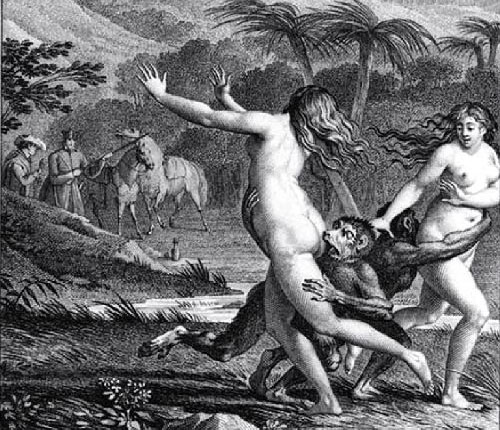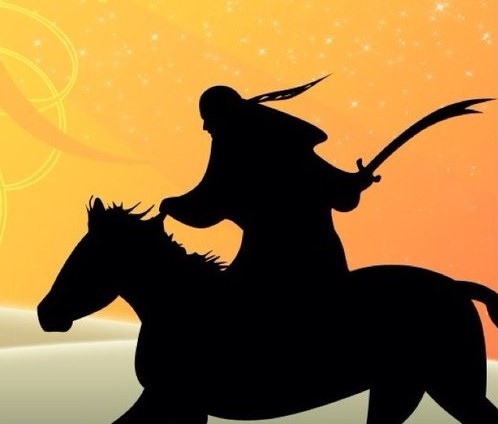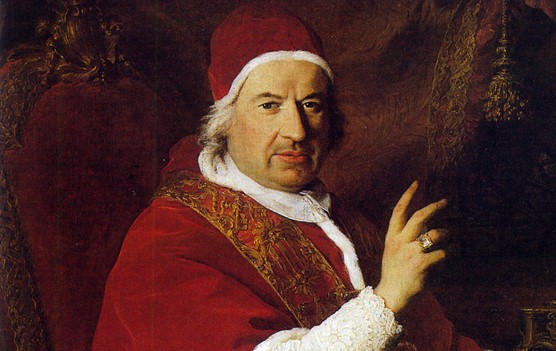Note: Almost all of the events of Voltaire’s play are fictional although it was inspired by an actual story, the conquest of Mecca, from the life of Muhammad.
The translation below is from 1901, for a more modern version click here.
We learnt at the beginning of the play that Mahomet (spelled as written in Voltaire’s play), the founder of Islam, was exiled from his native city, Mecca. He’s already a successful conqueror but Mecca is not yet under his rule. He sets up a siege of the city whose army leader, Zopir, remains a polytheistic believer of Arabia’s ancient gods and rejects Mahomet and his divine “revelation.” There’s a truce between the enemies and they’re supposed to discuss the terms of peace. Right from the start, Zopir is presented as a defendant of freedom while the Prophet of Islam is presented as an impostor. Zopir recalls that Mahomet killed his wife and two children many years ago, but he also killed Mahomet’s son.
Zopir argues with the senator of Mecca, Phanor, against a peace deal:
Zopir: Thinkest thou thy friend will ever bend the knee
To this proud hypocrite; shall I fall down
And worship, I who banished him from Mecca?
No: punish me, just heaven, as I deserve,
If e’er this hand, the friend of innocence
And freedom, stoop to cherish foul rebellion,
Or aid imposture to deceive mankind!1Voltaire. “Mahomet.” The Works of Voltaire: A Contemporary Version. Ed. John Morley. Trans. William F. Fleming (London: E.R. DuMont, 1901). Full text could be found at: https://en.wikisource.org/wiki/Mahomet_(Voltaire)
Phanor agrees but he acknowledges that a peace deal is necessary to avert war, especially that some in their midst in Mecca have already adopted Islam:
Phanor: But now he is a conqueror, and a king;
Mecca’s impostor at Medina shines
A holy prophet; nations bend before him,
And learn to worship crimes which we abhor.
Even here, a band of wild enthusiasts, drunk
With furious zeal, support his fond delusions,
His idle tales, and fancied miracles
But Zopir believes that a peace deal is in vain:
Zopir: Peace with a traitor! coward nation, what
Can you expect but slavery from a tyrant!
Go, bend your supple knees, and prostrate fall
Before the idol whose oppressive hand
Shall crush you all
Later, we find out that the two children of Zopir who he believes were killed are still alive. Palmira and Seid have been living with Mahomet since he kidnapped them in their infancy fifteen years earlier. They’re loyal to him since he cared for them as “orphans.” Even after Mahomet was banished out of Mecca, they’re still devoted to him. Zopir is not aware that Palmira and Seid are his own children.
Omar, the right arm of Mahomet, arrives with the terms of the peace deal, offering a portion of the spoils. Zopir rejects Mahomet’s offer:
Zopir: What Mecca worships Zopir can despise:
Be honest then, and with the impartial eye
Of reason look on Mahomet; behold him
But as a mortal, and consider well
By what base arts the vile impostor rose,
A camel-driver, a poor abject slave,
Who first deceived a fond, believing woman
And now supported by an ideal dream
Omar tries to tempt him with further political power:
Omar: The multitude are ever weak and blind,
Made for our use, born but to serve the great,
But to admire, believe us and obey:
Reign then with us, partake the feast of grandeur.
No longer deign to imitate the crowd,
But henceforth make them tremble.
Zopir declares he will not submit to Mahomet:
Zopir: I’ll follow thee: we then shall see who best
Can plead his cause: I will defend my gods,
My country, and her laws; thy impious voice
Shall bellow for thy vengeful deity,
Thy persecuting god, and his false prophet.
(Turning to Phanor)
Haste, Phanor, and with me repulse the traitor;
Who spares a villain is a villain: –come,
Let us, my friend, unite to crush his pride,
Subvert his wily purposes, destroy him,
Or perish in the attempt: If Mecca listens
To Zopir’s councils, I shall free my country
From a proud tyrant’s power, and save mankind.
In a final attempt, Mahomet goes to face Zopir and threaten him to submit to his forces:
Mahomet: Medina is my own,
And Mecca trembles at me; if thou holdest
Thy safety dear, receive the peace I offer.
Mahomet: Armed with the hallowed Koran I would teach thee
To tremble and obey in humble silence:
And with the subject world to kneel before me;
But I will talk to thee without disguise,
As man to man should speak, and friend to friend:
I have ambition, Zopir; where’s the man
Who has it not? But never citizen,
Or chief, or priest, or king projected aught
So noble as the plan of Mahomet;
In acts or arms hath every nation shone
Superior in its turn; Arabia now
Steps forth; that generous people, long unknown
And unrespected, saw her glories sunk,
Her honors lost; but lo! The hour is come
When she shall rise to victory and renown;
The world lies desolate from pole to pole;
India’s slaves and bleeding Persia mourns
Her slaughtered sons; whilst Egypt hangs the head
Dejected; from the walls of Constantine
Splendor is fled; the Roman Empire torn
By discord, sees its scattered members spread
On every side inglorious; —let us raise
Arabia on the ruins of mankind:
The blind and tottering universe demands
Another worship, and another God.
Crete had her Minos, Egypt her Osiris,
To Asia Zoroaster gave his laws,
And Numa was in Italy adored:
O’er savage nations where nor monarchs ruled
Nor manners softened, nor religion taught,
Hath many a sage his fruitless maxims spread;
Beneath a nobler yoke I mean to bend
The prostrate world, and change their feeble laws,
Abolish their false worship, pull down
Their powerless gods, and on my purer faith
Found universal empire: say not Zopir,
That Mahomet betrays his country, no:
I mean but to destroy its weak supports,
And banishing idolatry, unite it
Beneath one king, one prophet, and one God;
I shall subdue it but to make it glorious.
Zopir completely rejects his offer and accuses him of being barbaric:
Zopir: Is this thy purpose then, and darest thou thus
Avow it? Canst thou change the hearts of men,
And make them think like thee? Are war and slaughter
The harbingers of wisdom and of peace;
Can he who ravages instruct mankind?
After the doomed encounter ends, Mahomet talks to Omar and demands the murder of Zopir:
Mahomet: I want an arm
That will strike boldly.
Earlier we learn that Mahomet, who’s got several wives and concubines, had set his eyes on Palmira. But he noticed that there’s a growing affection between her and Seid who don’t know they’re siblings. He reveals his jealousy to Omar:
Mahomet: [K]now, midst all my queens
Palmira reigns sole mistress of my heart:
Think then what pangs of jealousy thy friend
Must feel when she expressed her fatal passion
For Seid.
Omar tells him that Seid is the perfect candidate for that murderous mission. Seid who had been indoctrinated in extremism and utter obedience to Mahomet would take on the killing of the infidel Zopir as a religious duty. A young passionate man like him is ideal for manipulation:
Youth is the proper period for delusion.
Mahomet immediately likes the plan which would free the way for him to have Palmira to himself.
Seid tells Palmira of his plan to kill Zopir but she objects that this deed goes against nature, the merciful values of religion and love. In way of enticing her to accept his mission, Seid tells her that the Prophet is ready to bless their union if he takes this hazardous mission.
Mahomet encounters Palmira and reminds her to be obedient and and supportive of Seid’s religious duty if she wants his blessing to their love. Palmira changes her mind and gives in.
In the following scene, Seid expresses to Mahomet hesitation about the mission. Mahomet assures him that his mission is approved by God:
Mahomet: Do as he [God] ordains;
That is the highest honor man can boast,
Blindly to execute his great decree:
Be thankful for the choice, and strike the blow:
The angel of destruction shall assist,
The God of armies shall protect thee.
Mahomet orders him to just obey:
Those who reason are not oft
Prone to believe; thy part is to obey.
Mahomet’s words could be better translated as follows: He who dares to think was not born to believe in me. Your only hope for glory is to obey in silence. (“Quiconque ose penser n’est pas né pour me croire. Obéir en silence est votre seule gloire.“)
At the end, both religious conviction and the desire to have Palmira drive Seid to look forward to committing the murder.
Seid: It is the voice
Of God that speaks in Mahomet—command,
And I obey.
Mahomet: Strike, then, and by the blood
Of Zopir merit life eternal.—Omar,
Attend and watch him well.
Later when he’s alone, Seid’s heart still questions the mission:
Seid: To sacrifice
A poor, defenseless, weak old man!— no matter:
How many victims at the altar fall
As helpless! Yet their blood in grateful streams
Rises to heaven: God hath sworn, and Seid shall perform
[…]
To mine, O guide this trembling hand, and thou
Exterminating angel who defendest
The cause of Mahomet, inspire this heart
With all thy fierceness!
Seid is in the presence of Zopir who is wondering why the young man seems disturbed, then expresses his bewilderment at his extremist convictions:
Zopir: Bound by a tyrant’s savage laws, thou thinkest
Virtue resides in Mussulmans alone;
Thy master rules thee with a rod of iron,
And shackles thy free soul in shameful bonds;
Zopir thou hatest, alas! Thou knowest him not:
I pardon thee because thou are the slave
Of Mahomet; but how cants thou believe
A God who teaches hatred, and delights
In discord?
At this encounter, Seid fails to complete the mission.
An Arab reveals the long-held secret in a letter to Zopir that Seid and Palmira are his own children. Mahomet and Omar find out that the identity of the pair’s father has been revealed and that Seid did not carry out the act.
Palmira goes to see Seid who is struggling with the purpose of Mahomet’s plot.
Seid: Explain the will of heaven which yet I know not;
Why am I chosen to be its instrument
Of vengeance?
Palmira: Seid, we must yield in silence,
Nor dare to question his decrees; he hears
Our secret sighs, nor are our sorrows hid
From Mahomet’s all seeing eye: to doubt
Is profanation of the deity.
His God is God alone; he could not else
Be thus victorious, thus invincible.
Seid responds:
Seid: He must be Seid’s God who is Palmira’s:
Yet cannot my astonished soul conceive
A being, tender, merciful, and kind,
Commanding murder; then again I think
To doubt is guilt: the priest without remorse
Destroys the victim: by the voice of heaven
I know that Zopir was condemned, I know
That Seid was predestined to support
The law divine: so Mahomet ordained,
And I obey him: fired with holy zeal
I go to slay the enemy of God;
And yet methinks another deity
Draws back my arm, bids me spare the victim.
Religion lost her power when I beheld
The wretched Zopir; duty urged in vain
Her cruel plea, exhorting me to murder;
With joy I listened to the plaintive voice
Of soft humanity: but Mahomet—
How awful! How majestic! Who can bear
His wrath? His frowns reproached my shameful weakness;
Religion is a dreadful power: alas!
Palmira, I am lost in doubts and fears,
Discordant passions tear this feeble heart:
I must be impious, must desert my faith,
Or be a murderer: Seid was not formed
For an assassin; but ‘tis heaven’s command,
And I have promised to avenge its cause
Seid and Palmira go to see Zopir who’s about to pray at the altar of his local gods. Zopir is resigned to the fact he will perish soon and perhaps, as he now knows, at the hands of his own child. He looks at them and says that he wishes to embrace his own children before he dies. They’re perplexed to hear such words but they ignore them. Zopir moved towards the altar to offer what could be his last prayer.
Seid: See! He prays to his false gods:
This is the time to end him.
Seid: To serve my God, to please and merit thee,
This sword, devoted to the cause of heaven,
Is drawn, and shall destroy its deadliest foe;
Yon dreary walk invites me to the deed,
Methinks the path is bloody, wandering ghosts
Glide through the shade, and beckon me away.
Seid: Ministers of death,
I follow you; conduct me to the altar,
And guide my trembling hand!
Zopir walks behind the altar and Seid follows him. He pulls the sword and finally stabs Zopir. When Seid emerges from behind the altar, Palmira asks what happened.
Seid: The voice of heaven, seized with this desperate hand
His silver hairs, and dragged him to the earth:
‘twas thy commant: O God! Thou couldst not bid me
Commit a crime! Trembling and pale a while
I stood aghast, then drew this sacred sword,
And plunged it in his bosom: what a look
Of tenderness and love the poor old man
Cast on his murderer! A scene so mournful
Ne’er did these eyes behold: my heart retains
And will forever keep the sad idea:
Would I were dead like him!
Seid is overtaken with remorse. Phanor arrives at the scene where Zopir is bleeding to death. He yells that Seid killed his own father. Seid and Palmira are in shock at the revelation. Palmira also finds out that the one she loves is her own brother.
Seid: My gratitude, my duty, my religion,
All that mankind hold sacred, urged me on
To do the worst of actions.
Zopir gets a chance to embrace them before his final breath and asks Seid to avenge him.
Omar walks in onto the scene and, and in a dirty trick, orders the arrest of Seid for having killed Zopir. Palmira and Seid are in disbelief since they all know that Mahomet ordered the killing. Mahomet intends to deceive the people of Mecca under the guise of bringing law and order.
Omar tells Mahomet that the people of Mecca are rising up at the news of the death of their leader. But those who believe in Mahomet are spreading the message that what happened is divine intervention against the infidel leader. He tells Mahomet that he had already denied any involvement in that crime and assures him that Seid is taken care of because they forced him to drink poison. Now Mahomet is free to pursue Palmira, unaware that she already found out the fatherhood secret.
In the following scene, Mahomet is standing before Palmira who launches accusations at him for being a savage and an impostor. She renounces his religion:
Palmira: What joys, what blessings, or what happiness
Can I expect from thee, thou vile impostor?
Thou bloody savage!
[…]
The maddening multitude already armed
In the defense of injured innocence?
From the death’s dark shades my murdered father comes
To lead them on: O that these feeble hands
Could tear thee piece-meal, thee and all thy train!
Would I could see them weltering in their blood;
See Mecca, and Medina, Asia, all
Combined against thee! That the credulous world
Would shake off thy vile chains and thy religion
Become the jest and scorn of all mankind
In the final scene, Seid is dying from poison. Palmira is hopeful that the crowd might kill Mahomet to avenge her father and her brother who was forced to drink poison.
Mahomet appears before the crowds and threaten great violence.
Mahomet: Learn
From Seid’s fate, ye unbelievers, how
To reverence Mahomet whom heaven defends;
And this pale corpse hath witnessed their obedience;
The sword of fate hangs o’er your heads, beware
It fall not on you: thus will I reward
All impious rebels, all vile infidels,
And punish every word and thought against me.
If I withhold my rage, and let you live,
Remember, traitors, that you owe your beings
To my indulgence; hasten to the temple,
Prostrate yourselves before the throne of grace,
And deprecate the wrath of Mahomet.
Out of fear while watching Seid in the throes of death, the crowd disperses. They seems to believe that it was an act of God. They embrace the new faith of Islam. When the crowd withdraws, Palmira realizes that her brother won’t be avenged. Rather than be a slave for Mahomet, she grabs the sword of Seid, she stabs herself and says:
Palmira: let Mahomet reign here in peace:
this world was made for tyrants
Mahomet is in grief over dead Palmira which drives him to a moment of regret about his role in killing a father and his children. Then he demands that people should not know about his crimes as he looks forward to ruling over humankind through deceit:
MAHOMET: let me reign o’er a deluded world:
For Mahomet depends on fraud alone,
And to be worshipped never must be known.
Note: All the above controversial passages are available in the original language (French) on this page.
You might also like:

Candide: The shocking passages
Condemned by the French government and the Catholic Church: Read the controversial passages from Voltaire’s Candide (1759)
BOOK: CANDIDE

The jihadi manifesto: Sayyid Qutb’s Milestones
Summary and excerpts from the radical text that inspired terror attacks over the last 40 years
BOOK: MILESTONES
Endnotes





